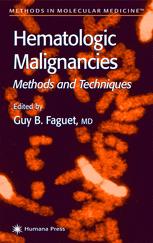

Most ebook files are in PDF format, so you can easily read them using various software such as Foxit Reader or directly on the Google Chrome browser.
Some ebook files are released by publishers in other formats such as .awz, .mobi, .epub, .fb2, etc. You may need to install specific software to read these formats on mobile/PC, such as Calibre.
Please read the tutorial at this link. https://ebooknice.com/page/post?id=faq
We offer FREE conversion to the popular formats you request; however, this may take some time. Therefore, right after payment, please email us, and we will try to provide the service as quickly as possible.
For some exceptional file formats or broken links (if any), please refrain from opening any disputes. Instead, email us first, and we will try to assist within a maximum of 6 hours.
EbookNice Team

Status:
Available0.0
0 reviewsRecent advances in molecular biology are transforming the treatment of hematologic malignancies by providing powerful new tools useful in both diagnosis and the assessment of new therapies. In Hematologic Malignancies: Methods and Techniques, a panel of acknowledged experts review many of the key molecular methods used for the diagnosis and subsequent management of hematologic malignancies. These clinically relevant techniques range from routine test procedures to highly sophisticated methods currently offered only by specialized reference laboratories, and fall into five major groups: cytogenetics, polymerase chain reaction, flow cytometry, cytochemistry and immunochemistry, and apoptosis and cytokine receptors. Presented by investigators with extensive experience, and serving not only as a reference for seasoned research and clinical laboratory personnel, but also as a guide for the less experienced, each method contains sufficient detail to ensure its successful replication.
Serving both clinical and experimental needs, Hematologic Malignancies: Methods and Techniques provides an array of powerful tools that will guide clinicians- especially hematologists, oncologists, and pathologists-to better diagnose and manage their patients with hematologic malignancies, and enable researchers to assess the anticancer effect of agents that impact cancer cells at the molecular level.